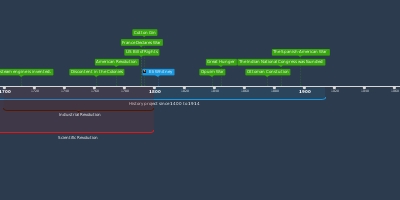1 gen 1762 anni - Discontent in the Colonies
Descrizione:
In 1763, British power stretched from India to North America and the Caribbean, but the cost of creating the empire was high. Britain was facing an enormous postwar debt and already‐high taxes as well as the need to finance the administration of its newly acquired lands. The British expected the American colonies, which prospered during the Seven Years' War through lucrative military contracts despite additional taxes, to assume at least part of the financial burden. The colonists had expectations as well: unfettered access to western lands, for example. Although most considered themselves English subjects and were proud to have helped Britain win an empire, a sense of American identity was developing. The colonists had gained greater control over their lives during the war, through their colonial assemblies' exacting concessions from royal governors as the price for raising revenue, and whether the colonists would again meekly accept the role of imperial subject was unknown.The Seven Years' War had begun over control of the Ohio River Valley; affairs in that region became the first issue the British faced in governing their new empire. France's Indian allies certainly knew that the British victory meant more and more settlers would flood onto their lands. In the spring of 1763, Pontiac, an Ottawa leader, formed a coalition of tribes to drive the British off the western lands. Pontiac's Rebellion caused chaos in the Great Lakes region as his forces overran eight British forts and threatened both Detroit and Pittsburgh. The British fought back by giving Indians smallpox‐infected blankets, an early example of biological warfare. Although Pontiac himself did not agree to peace until 1766, Parliament tried to placate the Indians through legislation.
Aggiunto al nastro di tempo:
Data:
1 gen 1762 anni
Adesso
~ 263 years ago
